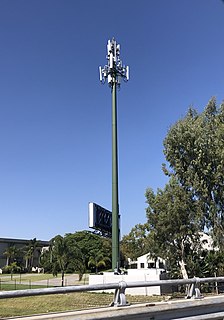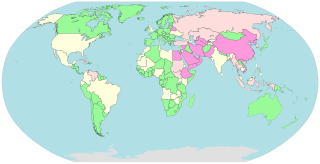Related Research Articles
Communications in Malawi includes the country's postal, telephone, television, radio and internet services.
'Telecommunications in the Republic of the Congo include radio, television, fixed and mobile telephones, and the Internet.
Telecommunications in Sudan includes fixed and mobile telephones, the Internet, radio, and television. Approximately 12 million out of 45 million people in Sudan use the Internet, mainly on smartphones and mobile computers.

Telecommunications in Armenia involves the availability and use of electronic devices and services, such as the telephone, television, radio or computer, for the purpose of communication. The various telecommunications systems found and used in Armenia includes radio, television, fixed and mobile telephones, and the internet.

Internet censorship in Pakistan is government control of information sent and received using the Internet in Pakistan. There have been significant instances of website access restriction in Pakistan, most notably when YouTube was banned from 2012–2016. Pakistan has asked a number of social media organisations to set up local offices within the country, but this is yet to happen.

Internet censorship is the control or suppression of what can be accessed, published, or viewed on the Internet enacted by regulators, or on their own initiative. Internet censorship puts restrictions on what information can be put on the internet or not. Individuals and organizations may engage in self-censorship for moral, religious, or business reasons, to conform to societal norms, due to intimidation, or out of fear of legal or other consequences.

The Internet in South Africa, one of the most technologically resourced countries on the African continent, is expanding. The Internet country code top-level domain (ccTLD) .za is managed and regulated by the .za Domain Name Authority (.ZADNA) and was granted to South Africa by the Internet Corporation for Assigned Names and Numbers (ICANN) in 1990. Over 60% of Internet traffic generated on the African continent originates from South Africa. As of July 2016, 29.3 million people were Internet users.
Before the era of internet business in Indonesia, internet connections could only be found at a few leading universities. By using UUCP, university servers in Indonesia exchange information with other university servers in the world through their respective gateways. In 1994, the internet business in Indonesia was started, marked by the granting of an internet service provider (ISP) company license issued by the Indonesian government to PT. Rahajasa Media Internet or RADNET.
Most Internet censorship in Thailand prior to the September 2006 military coup d'état was focused on blocking pornographic websites. The following years have seen a constant stream of sometimes violent protests, regional unrest, emergency decrees, a new cybercrimes law, and an updated Internal Security Act. Year by year Internet censorship has grown, with its focus shifting to lèse majesté, national security, and political issues. By 2010, estimates put the number of websites blocked at over 110,000. In December 2011, a dedicated government operation, the Cyber Security Operation Center, was opened. Between its opening and March 2014, the Center told ISPs to block 22,599 URLs.
The Internet is accessible to the majority of the population in Egypt, whether via smartphones, internet cafes, or home connections. Broadband Internet access via VDSL is widely available. Under the rule of Hosni Mubarak, Internet censorship and surveillance were severe, culminating in a total shutdown of the Internet in Egypt during the 2011 Revolution. Although Internet access was restored following Mubarak's order, government censorship and surveillance have increased since the 2013 coup d'état, leading the NGO Freedom House to downgrade Egypt's Internet freedom from "partly free" in 2011 to "not free" in 2015.
Bahrain has been connected to the internet since 1995, and made it readily available to its citizens. The country's domain suffix is '.bh'. A 2004 study showed a liberal filtering system is used in Bahrain, one which can be easily bypassed, however more recent events have shown more sophisticated and pervasive filtering. In January 2009, Bahrain has started blocking a vastly increased number of sites through the Information Affairs Authority (IAA). The new filtering has had a noticeable impact in internet access speeds for all traffic.
Use of the Internet in Qatar has grown rapidly and is now widespread, but Internet access is also heavily filtered.
The Internet in Zimbabwe has seen rapid expansion in recent years. The Internet country code top-level domain is .zw. In 2009, the Mugabe-Tsvangirai Government of National Unity established a Ministry of Information and Communications Technology to focus on ICT growth and development.
Access to the Internet in Azerbaijan is growing, supported by a national strategy to develop the country into an information and communication technology (ICT) hub for the Caucasus region. The Azerbaijani government actively seeks to attract foreign aid to help boost the telecommunications and ICT sectors. While the government claims 85 percent of the population was online in 2013, service provider Baktelekom has provided free Wi-Fi zones in several points of Baku like the National Flag Square, the Boulevard, Old City, the park around the Heyder Aliyev Centre, parks of Sahil, Sabir, Samad Vurghun, Winter Park, as well as Port Baku Residence and Port Baku Mall.
Like many developed and developing countries, the Internet in Bangladesh has witnessed significant growth. Although facing many constraints in expanding Internet access and use, development of the Internet and Information Technology are high government priorities. In March, 2021 Internet users in Bangladesh increased to 116 million. On 19 February 2018, Bangladesh started the 4G network service.
Telecommunications in Angola include telephone, radio, television, and the Internet. The government controls all broadcast media with a nationwide reach.
The Internet in Kazakhstan is growing rapidly. Between 2001 and 2005, the number of Internet users increased from 200,000 to 1 million. By 2007, Kazakhstan reported Internet penetration levels of 8.5 percent, rising to 12.4 percent in 2008 and 34.3% in 2010. By 2013, Kazakhstani officials reported Internet penetration levels of 62.2 percent, with about 10 million users. There are five first-tier ISPs with international Internet connections and approximately 100 second-tier ISPs that are purchasing Internet traffic from the first-tier ISPs. As of 2019, more than 75% of Kazakhstan's population have access to the internet, a figure well ahead of any other country in Central Asia.
Internet censorship in Ireland is a controversial issue with the introduction of a graduated response policy in 2008 followed by an effort to block certain file sharing sites starting in February 2009. Beyond these issues there are no government restrictions on access to the Internet or credible reports that the government monitored e-mail or Internet chat rooms. Individuals and groups could engage in the expression of views via the Internet, including by e-mail. Irish law provides for freedom of speech including for members of the press, and the government generally respects these rights in practice. An independent press, an effective judiciary, and a functioning democratic political system act jointly to ensure freedom of speech and of the press.
Communications in the State of Palestine occur across many media, including telephone, radio, television, and internet. The telecom infrastructure is growing at a very rapid pace and continually being updated and expanded.

This list of Internet censorship and surveillance in Asia provides information on the types and levels of Internet censorship and surveillance that is occurring in countries in Asia.
References
- ↑ "Malawi blocks social media networks to quell protests", IDG News Service, 22 July 2011, accessed 14 December 2014
- ↑ "2010 Human Rights Report: Malawi", Bureau of Democracy, Human Rights, and Labor, U.S. Department of State, 8 April 2011
- ↑ "Internet VAT bites consumers", Biztech Africa, 24 July 2014, accessed 14 December 2014
- ↑ "Freedom on the Net 2014 Report: Malawi", Freedom House, 4 December 2014, accessed 14 December 2014
- ↑ "Malawi Voice editor Justice Mponda arrested for extortion", Nyasa Times, 1 November 2013, accessed 14 December 2014
- ↑ "ONI Regional Overview: Sub-Saharan Africa", OpenNet Initiative, September 2009
- ↑ Censorship of Historical Thought: A World Guide 1945-2000 Archived 2011-07-22 at the Wayback Machine , Antoon De Baets, Greenwood Press, 2002, updated 2005, pp. 339-342
- ↑ "Malawi country profile", International Telecommunication Union (ITU), 2009, accessed 31 May 2011
- ↑ "List of Licensed ISPs in Malawi as of 10 August 2009", Malawi Internet Service Providers' Association (MISPA), accessed 31 May 2011
- ↑ "Malawi Internet Exchange (MIX)", Malawi Internet Service Providers' Association (MISPA), accessed 31 May 2011